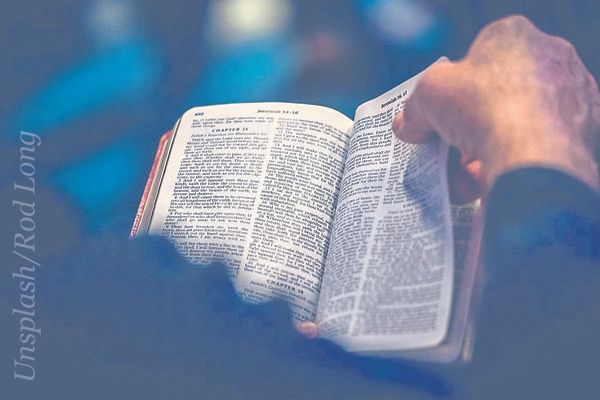You’ve probably forgotten. It happened back in August. Even then it may not have stirred your interest.
Five Britons and a Canadian, living in Saudi Arabia and facing sentences ranging from death to 12 years in prison, were given free royal pardons and released from jail.
The charges related to a series of bombings in Autumn 2000 in which other expatriates were killed or maimed when their cars exploded. Some of the accused were featured on Saudi (and British) television confessing their crimes. They later claimed that their patently false confessions had been extracted by torture.
So, what has that got to do with us?
Strong stuff
The point of contact is the ‘free pardon’ they received. At its heart, the message of the Christian gospel is that we too may receive such a pardon. Let me explain.
You and I may never have committed a crime. Yet, says the Bible, we are all guilty in the sight of God. The apostle Paul writes: ‘Whatever the law [of God] says, it says to those who are under the law, that every mouth may be stopped and all the world may become guilty before God’ (Romans 3:19).

Strong stuff! Like ‘the Saudi six’, we naturally deny the charge. They admitted breaking the strict Saudi alcohol laws — but murder? Crimes worthy of death? Never, they protested.
So we also admit to small sins and faults. No one is perfect. But surely the good outweighs the bad in most of us? Not so, replies the Bible — for ‘there is none righteous, no not one’, and ‘the soul that sins shall die’ (Romans 3:10-11; Ezekiel 18:4).
Spiritually speaking, God has pronounced every one of us guilty and has sentenced us to death. And, unlike the Saudi accusers, God’s judgement is both fair and righteous; he charges no man falsely and he doesn’t make mistakes.
If God says we are guilty, only a brave (or foolish?) man will contradict him.
Protest
Most of us continue to protest our innocence, of course. But as long as we do so we shall not seek God’s free pardon. Why not? Because a free pardon presupposes guilt. Monarchs do not pardon innocent men and women — there is no need! Only guilty people can be truly pardoned.
King David discovered this for himself: ‘When I kept silent, my bones grew old through my groaning all the day long … [but when] I said, “I will confess my transgressions to the Lord” … you forgave the iniquity of my sin’ (Psalm 32:3-5).
We may not understand just how greatly we have offended the holiness of God by the way we live. But he reads our innermost thoughts and sees the pride, aggression and uncleanness that is hidden from our closest friends.

When the light of God’s Word searches our hearts, we see what we truly are by nature — rebels and sinners. How can we escape God’s condemnation?
Free forgiveness
Our first instinct is to work our way out of trouble. We try to compensate for our natural sinfulness by performing good works of various kinds. We try to make the ‘good’ outweigh the ‘bad’. But that can never be enough — for ‘by the deeds of the law no flesh will be justified in [God’s] sight, for by the law is the knowledge of sin’ (Romans 3:20).
Put simply, as we try to please God by obeying his law and doing good, we discover just how sinful we really are. Far from satisfying his holy requirements, we begin to see how impossible it is to justify ourselves.
How does the gospel resolve this impasse? Listen to Paul again: ‘All have sinned and fall short of the glory of God, being justified freely by his grace through the redemption that is in Christ Jesus’ (Romans 3:23-24).
At its simplest, the Christian message is this. When Jesus died on the cross, God the Father laid on him the guilt and punishment of a world of sinners — of ‘a great multitude, which no man could number, of all nations, and kindreds, and people, and tongues’ (Revelation 7:9).

These are the redeemed, chosen not for any merit of their own but out of free grace — God’s breathtaking generosity to undeserving sinners.
Legal basis
Furthermore, there is a legal basis to God’s free pardon. Since Christ bore their sins, the redeemed no longer have to do so. ‘By one offering he has perfected for ever those who are set apart’ (Hebrews 10:14). They receive a free pardon from God for all their sins — past, present and future — through the death of Christ as an offering and atonement for sin.
Those for whom Christ died will most certainly hear the gospel, believe the gospel, and be ‘born of the Spirit’. They become ‘new creations in Christ’ and no longer desire to sin but have God’s laws written in their hearts. They bear ‘the fruit of the Spirit, which is love, joy, peace, patience, kindness, goodness, faithfulness, gentleness and self control’ (Galatians 5:22-23).
Let the apostles John and Peter sum up the matter for us: ‘If we say that we have no sin we deceive ourselves … but if we confess our sin [God] is faithful and just to forgive us our sins and to cleanse us from all unrighteousness’ (1 John 1:8-9).
‘Christ also suffered once for sins, the just for the unjust, that he might bring us to God’ (1 Peter 3:18).




